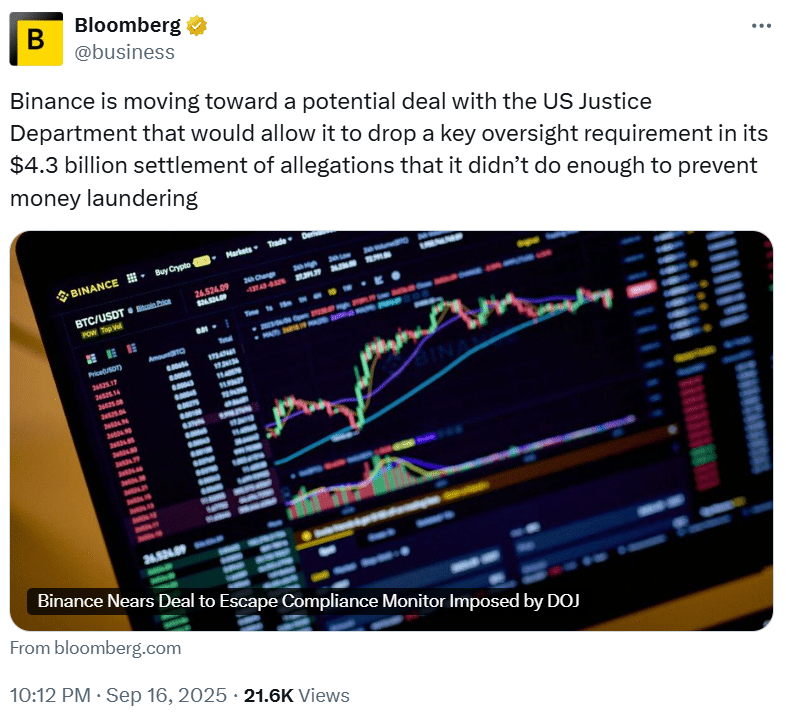Binance, the world’s largest cryptocurrency exchange, is moving towards a deal with the U.S. Justice Department (DOJ). This deal could remove a critical oversight requirement from its $4.3 billion settlement.
- Key Developments in Binance DOJ Settlement
- The DOJ’s Shift in Approach to Corporate Monitoring
- Binance’s Legal Troubles and Original DOJ Settlement
- The DOJ’s Internal Review of Corporate Monitors
- Binance’s Efforts to Improve Compliance
- Systemic Risk in the Crypto Industry and DOJ Oversight
- Future of the Binance DOJ Settlement and Compliance Monitor
- Impact on the Crypto Industry and Other Exchanges
- Conclusion
- Appendix – Glossary of Key Terms:
- FAQs for Binance DOJ Settlement
The settlement was made for money laundering violations. The key change under negotiation is the potential end of the compliance monitor, which was imposed as part of the settlement agreement.
Key Developments in Binance DOJ Settlement
As part of the 2023 Binance settlement with the DOJ, the company committed to keeping an independent compliance monitor for three years. But there are also reports that the DOJ may be amenable to doing away with this requirement.
Federal prosecutors are in discussions that could involve pulling the monitor from his post. This movement reflects a broader trend in which the DOJ is approaching corporate monitoring activity, and it may signal future change with regard to how such agreements are treated.

The DOJ’s Shift in Approach to Corporate Monitoring
During the Trump administration, DOJ took a hard line on corporate compliance and frequently demanded independent monitors for companies that violated regulations. But there are now indications that the approach could be in for a rethink.
Also Read: Will Binance and Franklin Templeton Partnership Make 2025 the Year of Tokenized Assets?
These businesses — Glencore, NatWest and Austal USA — now are subject to expanded reporting requirements in place of those imposed by the independent monitor..
Binance’s Legal Troubles and Original DOJ Settlement
Binance’s run-ins with the law started when they pleaded guilty to charges of violating the Bank Secrecy Act, not registering as a money transmitting business and breaking sanctions laws.
As part of the agreement, Binance accepted two corporate monitors: one named by the DOJ and one named by the Treasury’s Financial Crimes Enforcement Network (FinCEN). The finCEN monitor overlay is still in effect – the one at issue here is a DOJ monitor.
The DOJ’s Internal Review of Corporate Monitors
DOJ is conducting an internal review of corporate monitors in response to multiple entities objecting to the costs and disruptions associated with such monitors.
Matthew Galeotti, head of the DOJ’s Criminal Division, described how independent monitors can help to prevent recidivism — and also end up being expensive and disruptive. As a result, the department is revisiting its use of monitors and considering other ways to ensure compliance.
Binance’s Efforts to Improve Compliance
But in reaction to its legal challenges, the company has tried to beef up compliance across the globe. The exchange launched Binance. It is being developed for the purpose of meeting U.S. regulatory requirements to comply with the DOJ’s regulations.
Binance has similarly worked with foreign law enforcement to help close financial crime cases, such as when India’s Enforcement Directorate took down a scam that used Binance.
This illustrates how serious Binance is about getting a fresh start as it aims to put its legal issues firmly in the rearview mirror
Systemic Risk in the Crypto Industry and DOJ Oversight
The situation at Binance highlights growing concerns in the cryptocurrency sector about systemic risks to its investors and exchanges. As the company attempted to comply with legal obligations, the DOJ
Future of the Binance DOJ Settlement and Compliance Monitor
If the compliance monitor is removed from the Binance DOJ payment, it could be a massive win for the company. Should the deal materialize, it would be a significant leap forward in Binance’s nightmares.

But, for this to happen I think Binance will have to implement stronger compliance reporting. That’s important, so the DOJ is confident that the exchange has effective controls in place to prevent a repeat offense.
Impact on the Crypto Industry and Other Exchanges
The current process of negotiation related to the Binance DOJ settlement may be indicative of what other cryptocurrency exchanges facing similar legal battles can expect. If Binance gets the compliance monitor removed, it could give other firms leverage in negotiations to strike better settlement terms.
Conclusion
The Binance DOJ settlement and compliance monitor removal will have implications in the cryptocurrency space. Potentially changing the future of regulatory supervision for crypto exchanges is the Department’s somewhat fluid position on corporate monitoring.
As Binance fights with the DOJ, its attempts to clean up its act and team up with the authorities suggest that it is aiming for a more regulated future.
But, the result of these negotiations will carry wider ramifications for the entire crypto industry. The resolution of the Binance DOJ settlement will be one of the most important regulatory battles in history, and whatever side it turns out to be on will resonate throughout the industry for some time.
Also Read: Binance Invests $53M in Medá Fintech to Expand Mexican Payments Access
Summary
Binance is in settlement talks with the U.S. DOJ that would enable it to waive a proposed compliance monitor in connection with its $4.3 billion money laundering penalty. This shift would help relieve some of the Binance’s operational burdens. The move aligns with revised DOJ approach to corporate oversight.
If it works, the move might also become a useful precedent for other crypto company in its regulatory negotiations, influencing copycat legal and compliance behavior in future value chains of the crypto industry.
Appendix – Glossary of Key Terms:
Binance DOJ Settlement: A $4.3 billion deal between Binance and the U.S. Justice Department to resolve accusations of money-laundering infractions.
Compliance Monitor: A third-party body that monitors the company’s compliance with legal or regulatory requirements.
Money Laundering Offense– A crime that involves creating the false appearance that money obtained from a criminal source was obtained legally
DOJ (Department of Justice): The United States federal department responsible for law enforcement and overseeing all federal legal matters.
FinCEN: A United States federal agency that has been made responsible for the collection and analysis of information about financial transactions in an effort to combat money laundering.
FAQs for Binance DOJ Settlement
1- What happens when the compliance monitor is removed from Binance?
It would lift Binance’s regulatory burden and add operational flexibility.
2- What does Binance’s DOJ settlement reveal about the crypto industry?
And it could also be a precedent for any future negotiations on crypto regulation.
3- What are the central details of Binance’s settlement?
A $4.3-billion fine with oversight of compliance, including monitors.
4- With the DOJ reviewing its monitor policy, what does that mean?
For the fear of cost and business operational disruption.






































